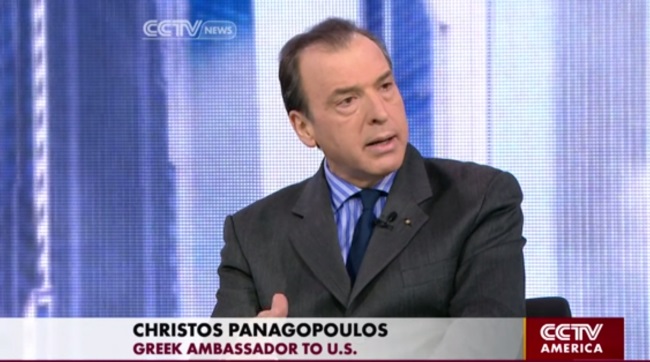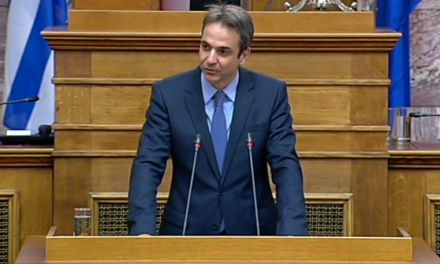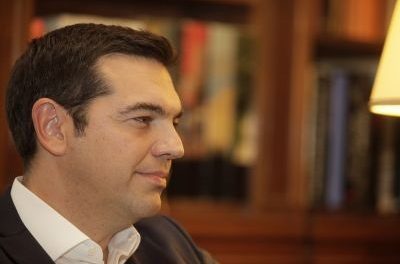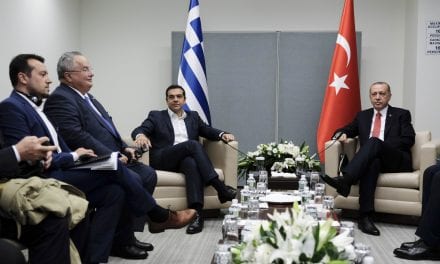WASHINGTON, Prime Minister Samaras aims to advance common agenda for stability and prosperity during August 8 visit.
The Greek government's top priority is to resolve its economic crisis, but Prime Minister Antonis Samaras will have a much broader agenda when he comes to the United States on an official working visit August 8, Greek Ambassador Christos Panagopoulos told Qorvis' Focus Washington.
"We are going through one of the most great eras of Greek-American relations," Panagopoulos told Focus Washington host Chuck Conconi. "We would like to promote our common agenda together."
A strategic ally
Greece is working through its economic crisis with the help of its European Union partners and allies like the United States, but the Greek government also wants to keep focus on the security situation in the eastern Mediterranean, where Greece plays a critical role.
"Despite the economic crisis, Greece is a pillar of stability in the eastern Mediterranean," Panagopoulos said, and, with Israel, its greatest friend in the region.
"If you have a look at the area, it is one of the most crucial neighborhoods, and you see the situation in Egypt and Syria. There are problems all over. Greece is the oldest member of NATO and the European Union in the area, so we feel somehow a special responsibility to bring in other parts of the western Balkans, for instance, to the Euro-Atlantic structures and again help our American and other partners to bring peace, stability, and prosperity to the area."
Confronting the economic crisis
Prime Minister Samaras will also discuss the state of the Greek economy during his visit. Greece has undertaken a series of structural reforms and made drastic cuts to the public sector.
"We are implementing our reforms across the board," Panagopoulos said. "We are trying to put in order our national finances, and that means cuts all over from the public sector–which, by the way, is not that much overinflated as some international media suggest, but we do need very badly some reforms. Then, we have a large privatization program underway right now."
The privatization program has slowed in large part because the values of public property and enterprises are depressed. The government would like to sell these properties at something closer to what it considers their real value.
"So the political apparatus is very reluctant to go out and sell public property where the prices are not what you could expect. So you need money, you have to get rid of your excess public property, but the moment may be not the most appropriate," the ambassador said.
Greece is carrying out all these reforms in the face of an overall unemployment rate of 26 percent and a youth unemployment rate of more than 50 percent, which Panagopoulos calls "the most tragic dimension of the economic crisis."
The effort has not been without its political fallout, and Greece has been the scene of numerous protests and demonstrations.
"In an open democratic society," says Panagopoulos, "there is a limit to what you can ask from the citizens. In a dictatorship, you can go and say, 'I decide; let's do it.' But in an open democratic society, you cannot do these things: Every other week, go back to your constituency and say we have to cut this and this."
A shift from austerity to growth
There appears now to be a growing point of view in the international financial community that Greece should shift away from austerity and emphasize growth.
"Too much austerity, that's what they say–the most appropriate people, IMF, you know, openly right now," says Panagopoulos. "They criticize their first recipe for the salvation of the Greek economy. We in Greece, we've lived through this, and it is really very tough."
The first priority of the government is growth policies, says the ambassador, "so we can create new jobs and absorb all these million and a half people that lost their jobs during the years of the crisis. It's a very difficult thing. We ask our partners to be supportive, and there are some actions coming from our European partners."
The myth of aid to Greece
Panagopoulos describes the notion that Greece is receiving donations of money as "a myth."
"Nobody is donating money to Greece up to now. They give you nice loans, some of our partners take profit out of this as we speak, while Greece faces all of these great difficulties…. They give us loans, and they restructure the debt."
PRNewswire



















